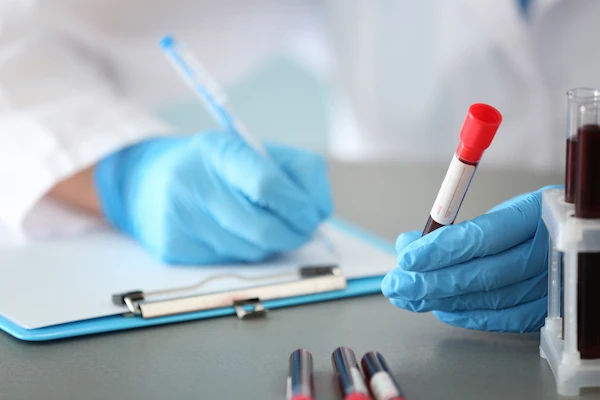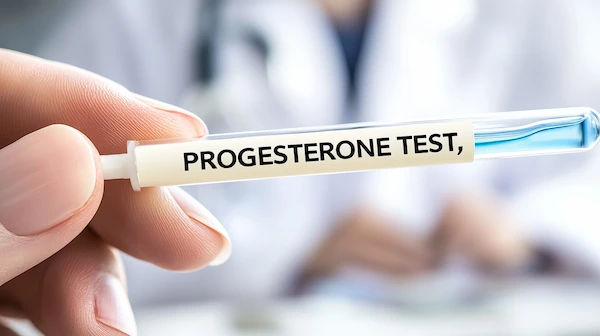Best Time to Take AMH, FSH, LH & Progesterone Tests During Cycle
Wondering when to take AMH, FSH, LH, or Progesterone tests? Learn the best days in your menstrual cycle for each hormone test to get accurate fertility insights and avoid timing mistakes.

Written by
Last updated on 17th Jul, 2025

If you're a woman tracking your fertility, trying to conceive, or investigating menstrual irregularities, your doctor will likely recommend a series of hormone tests, including AMH, FSH, LH, and Progesterone. Unlike some blood tests, the accuracy and interpretation of these fertility hormones are highly dependent on when you take them during your menstrual cycle. For women tracking ovulation, understanding this precise timing is crucial for getting meaningful results and guiding your fertility journey effectively.
Taking these tests at the wrong time can lead to skewed results, misinterpretations, unnecessary worry or incorrect treatment plans. Fortunately, with a clear understanding of how your hormones fluctuate throughout the month, you can ensure your tests provide the most accurate picture of your reproductive health. This guide will provide a cycle-day guide for the optimal timing of each hormone test, explain how hormone levels vary, highlight common timing mistakes, and offer tips for coordinating your tests.
How Hormone Levels Vary Through the Menstrual Cycle
The menstrual cycle is typically around 28 days long and is divided into two main phases: the follicular phase (before ovulation) and the luteal phase (after ovulation). A delicate hormonal balance drives each phase, with specific hormones rising and falling in a predictable pattern.
1. Follicle-Stimulating Hormone (FSH)
- When it's active: Early follicular phase (Days 1–5)
- What happens: FSH is released by the pituitary gland to stimulate the development of ovarian follicles, which contain the eggs. Its levels are highest at the very beginning of the cycle and gradually decrease as the follicles mature.
2. Luteinising Hormone (LH)
- When it's active: Mid-cycle (around Day 13–14)
- What happens: LH remains low during the follicular phase until a sharp surge occurs just before ovulation. This surge triggers the release of a mature egg from the ovary.
3. Estradiol (E2)
- When it's active: Late follicular to early luteal phase
- What happens: Produced by growing follicles, estradiol levels rise steadily, leading up to ovulation, peak just before the LH surge, then dip slightly and rise again during the luteal phase to support the uterine lining.
4. Progesterone
- When it's active: Luteal phase (after ovulation)
- What happens: After ovulation, the corpus luteum forms and secretes progesterone. Levels rise sharply, helping to stabilise the endometrium (uterine lining) in preparation for pregnancy. If pregnancy does not occur, progesterone levels fall, triggering menstruation.
5. Anti-Müllerian Hormone (AMH)
- When it's active: Consistent throughout the cycle
- What happens: AMH is produced by small ovarian follicles and reflects the ovarian reserve (egg count). Unlike other reproductive hormones, AMH remains relatively stable during the menstrual cycle, making it a reliable test at any time of the month.
Understanding these patterns is essential for timing certain hormone tests, evaluating ovulation, and diagnosing hormonal imbalances that may affect fertility.
Get Your Reproductive Health Assessed
Day-Wise Guide to Fertility Hormone Testing
Getting the timing right for your hormone tests during your menstrual cycle is key to getting accurate results. Here’s a simple day-by-day guide to when the most commonly tested fertility hormones are usually checked:
1. Anti-Müllerian Hormone (AMH)
- Best time to test: Any day of your menstrual cycle
- Why: AMH reflects the number of small developing follicles in the ovaries (ovarian reserve) and is not influenced by cycle day or hormonal fluctuations. This makes it a stable and convenient marker.
2. Follicle-Stimulating Hormone (FSH) & Estradiol (E2)
Best time to test: Cycle Day 2, 3, or 4 (Day 1 = first day of full menstrual bleeding).
Why:
- FSH should be at a baseline level in the early follicular phase. Elevated levels may suggest diminished ovarian reserve.
- Estradiol is tested alongside FSH because high estrogen levels can artificially suppress FSH, potentially masking signs of ovarian ageing.
3. Luteinising Hormone (LH)
Best time to test:
- Cycle Day 2, 3, or 4: To assess baseline LH levels and identify hormonal imbalances (e.g., PCOS).
- Mid-cycle (around Day 12–16): To detect the LH surge, which precedes ovulation by 24–36 hours.
Why: A significant LH surge confirms that ovulation is likely imminent. In contrast, abnormally high baseline LH (especially relative to FSH) may indicate PCOS.
4. Progesterone
Best time to test: 7 days after ovulation.
- Typically around Day 21 in a 28-day cycle, but should be adjusted if cycles are longer or shorter.
Why: Progesterone rises after ovulation and confirms that ovulation has occurred. Adequate levels in the luteal phase are important for supporting a potential pregnancy.
5. Estradiol (E2)
- Best time to test: Day 2, 3, or 4, typically alongside FSH.
- Why: Estradiol supports follicle development and uterine lining growth. Testing it early helps evaluate baseline estrogen levels and aids in interpreting FSH results, as high E2 can artificially suppress FSH.
This timing framework helps ensure accurate hormone analysis and effective fertility assessment. If you’re tracking your ovulation manually or using fertility monitors, tailoring these test days to your unique cycle length is best.
Timing Mistakes That Can Skew Results
Taking hormone tests at the wrong time in your cycle can lead to misleading results, potentially causing unnecessary anxiety or misdiagnosis:
- Testing FSH/Estradiol too late in the follicular phase: If tested closer to ovulation, Estradiol levels will naturally be higher, which can artificially suppress FSH, making ovarian reserve appear better than it is.
- Testing Progesterone too early or too late in the luteal phase: If tested before 7 days post-ovulation, the level might not have peaked, leading to a false negative for ovulation confirmation. If tested too late, it might have already started to decline.
- Not accounting for irregular cycles: If your cycles are irregular, simply counting "Day 3" or "Day 21" might not align with your actual hormonal phases. Your doctor might use other methods (like ultrasound monitoring) to pinpoint the correct testing window.
- Ignoring recent hormonal medication: If you've recently been on birth control or other hormonal medications, these can significantly impact your natural hormone levels, and your doctor will advise on a washout period before testing.
Always communicate your cycle length and any irregularities to your doctor and the lab when scheduling.
How to Coordinate Tests With Apollo’s Booking Slots
Coordinating your hormone tests with specific cycle days requires a bit of planning. Here’s how you can make it work with Apollo 24|7:
- Consult Your Doctor First: Get clear instructions from your doctor on which tests you need and the exact cycle day(s) they recommend for each.
- Track Your Cycle: Accurately track your menstrual cycle, noting the first day of your period (Day 1).
- Plan Ahead: Once you know your target testing day(s), visit the Apollo 24|7 website or app.
- Use Online Booking: Use their easy online booking system to select your desired test panel (e.g., a specific hormonal panel) and choose a date and time that aligns with your cycle day requirements.
- Home Sample Collection: Apollo 24|7's home sample collection service is particularly convenient for cycle-timed tests, as it allows you to schedule a precise time without having to travel.
- Communicate: Inform the phlebotomist (person drawing blood) about the specific cycle day you are on, especially for tests like FSH, LH, and Estradiol.
Schedule Hormonal Panels With Cycle Matching
Apollo 24|7 offers various hormonal panels that can be scheduled to match your cycle requirements, ensuring you get the most accurate and interpretable results for your fertility assessment.
Why Choose Apollo 24|7 for Your Fertility Hormone Testing?
- Comprehensive Test Panels: Access specific hormone tests like AMH, FSH, LH, and Progesterone, often grouped into comprehensive Fertility Hormone Panels Female, designed for women tracking ovulation.
Book an Apollo Fertility Profile Female Panel Test
- NABL-Accredited Labs: Tests are done in labs certified by the National Accreditation Board for Testing and Calibration Laboratories (NABL), ensuring accurate and trustworthy results.
- Home Sample Collection: Enjoy the convenience of blood sample collection at your home, saving you time and providing privacy, which is ideal for precise cycle-timed tests.
- Easy Online Booking: Schedule your test quickly and easily through the Apollo 24|7 app or website, allowing you to select specific dates that align with your cycle.
- Fast Digital Reports: Receive secure, detailed test reports online promptly, ready to share with your doctor for timely interpretation.
- Trusted Brand: Benefit from the trusted expertise and healthcare legacy of Apollo Hospitals Group, one of India’s most respected medical networks.
By choosing Apollo 24|7, you get access to dependable, convenient diagnostic services that make it easier to understand and manage your reproductive health effectively.
Conclusion
Timing is crucial when it comes to fertility hormone tests like AMH, FSH, LH, and Progesterone. Understanding how these hormone levels vary throughout your menstrual cycle is crucial for obtaining accurate results that can truly guide your fertility journey.
By following a cycle-day guide for optimal testing, avoiding common timing mistakes, and coordinating your appointments effectively, you empower yourself to get the most meaningful insights into your reproductive health. If you're a woman tracking ovulation or investigating fertility concerns, consult your doctor to determine the precise timing for your hormone tests, and take this proactive step towards understanding and managing your fertility.



